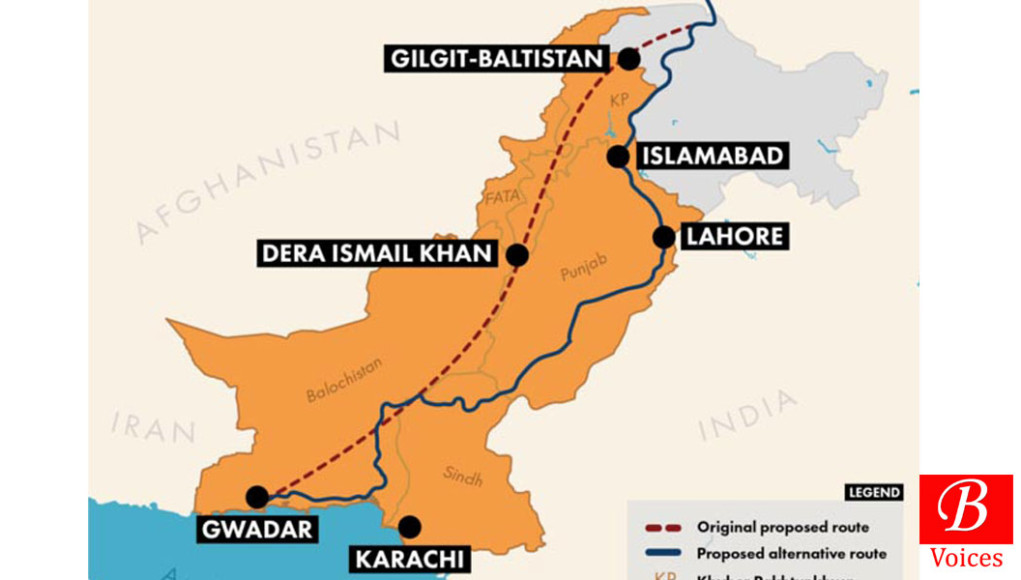Hazrat Shah Kakar
It has been more than three decades that the atmosphere of our country, especially of the underdeveloped regions, is changing from bad to worse. Not only are there strained relations between the center and federating units, but also the monster of terrorism has engulfed the impoverished areas, particularly during the last decade. A lot of controversy exists whenever there are deliberations over the distribution of resources among the provinces. The province of Punjab has always been feared of and blamed for its domineering role and sphere of influence over central policies. But, by the turn of century, Pakistan got the opportunity to become a stronger federation by making the CPEC project less controversial and more successful.
China Pakistan Economic Corridor (CPEC), focusing mainly on economic sector, is a new chapter in the bilateral relations between China and Pakistan. It will connect the Xingjian, western part of China, with Pakistani deep sea port of Gwadar. It is not a transit corridor that can be replaced with any route that reaches the sea; it is an economic corridor that aims at boosting Pakistan’s development as a modern and industrialized country. Unsurprisingly, the CPEC is usually called by the general intelligentsia as the ‘game-changer’, a project that will change the destiny of the nation. Comparatively, China is more interested in the project since it is less costly than the Chinese export through Malacca and Harmoz straits to Middle East and Europe.
Also read: CPEC and Chinese Economic Expansionism
Like Pakistan, there are areas in China which are less developed than the other parts of the country. The western part of China, closer to the Pakistani territory, does not enjoy as much development as is done by the rest of China. Of the many purposes, for the Chinese policy makers, one is to develop and bring in line the western part with the rest of the country. Such initiative will help reduce the burden of grievances voiced by the underdeveloped masses. Similarly, with this the religious extremism that has reared its head in some areas near Xingjian will also fade away.
CPEC is not a transit corridor; it is an economic corridor that aims at boosting Pakistan’s development
Unfortunately, our leadership is not so much visionary as that of China. Before the project could achieve its desired results, the CPEC has become controversial. It is pertinent to mention here that political bickering is increasing among the four provinces of Pakistan. Parties are all trying to get the major chunk out of the CPEC funding. The planning commission of Pakistan has proposed three routes that would connect Khunjrab and Gawadar. The designed routes are the western, middle and the eastern routes. It is feared by the stake holders of the smaller provinces that federal government would try to develop eastern route as soon as possible at the cost of western route. Some have even labeled the CPEC as China-Punjab Economic Corridor. Sadly, Federal government is internalizing the decisions of federation for the mere interest of ‘bigger province’. That is, perhaps, why the data related to the project has been kept classified and not made public.
Federal government is internalizing the decisions of federation for the mere interest of ‘bigger province’
Pakistan, a fragile federation, is faced with many grisly challenges. The CPEC project, if made successful with the consensus of all stake holders, can resolve all the disputes and lead us towards a stronger federation. Firstly, due to weak and unstable civilian governments and rule of the dictators for more than three decades, the smaller provinces have comparatively been kept deprived and denied their due constitutional rights. Consequently, some movements organized either for their constitutional rights or secessions, like in Balochistan, have always irritated the federation.
Secondly, the monster of terrorism has heavily struck the areas bordering the Durand Line. The menace of Terrorism, that has adversely affected the population economically, is a result of Islamabad’s decade long policies striving for strategic depth in Afghanistan. During the process our rulers have kept on manufacturing proxies rather than making policies. The development of the CPEC, especially the western route, will force our policy makers to revisit our past policies and focus more and more on human development. Significantly, economic stability and wave of terrorism cannot run parallel. For making the under-developed areas economically more prosperous and stable, there is a dire need to scuttle the off-shoots of militants and quit militants-oriented policies. Prioritizing the western route, since it is shorter in distance, will not only address the reservations of the underdeveloped areas but also make those areas terror-free.
For achieving the desired objectives, it is high-time for the Prime Minister of Pakistan to take stake holders of all the provinces into confidence on key national issues. For that matter, the federal government should make the functioning of Council of Common Interests (CCI) more effective. In the same way, there should be open deliberations over CPEC project in the parliament, particularly in the senate, which has equal representation of all provinces. A powerful standing committee comprising of members from all political parties should not only be made but also authorized to hold accountable the planning commission. This is the appropriate way that the CPEC project which holds geostrategic and geopolitical significance can drive us towards stronger federation otherwise the country will descend into further chaos.
Writer is a student of Political in Government College University Lahore and a former member of Youth Parliament of Pakistan.
Share your comments!








